Topic: Chasing the Zeitgeist
Chickens, Coming Home, Roosting
It seems the chickens are coming home to roost for the administration. At least they were on Thursday, May 4th, and that's as good an "old saying" as any. Here's a sampling of that day's returning chickens.
Chicken Number One: What You Said That You Really Didn't Say
It seems that our first lady, Laura Bush, in an interview on CNN with John King midweek, defended her husband, the current president, by telling King that everyone misunderstood - when the president gave that nationally televised speech under that "Mission Accomplished" banner on the Abraham Lincoln three years ago, he only meant that the mission of that particular aircraft carrier had been accomplished. She didn't see why people didn't get it, and thought he was saying we'd fixed the Iraq problem. Yes, we all misunderstood. There's a satiric and mildly clever rewrite of the actual speech with the hidden subtext we all missed here, but this is a minor thing. She holds no office and makes no decisions. Her husband is "the decider." He said so. He said that in the defense of defense secretary Donald Rumsfeld, with all the recent calls for his ouster. No one else can decide he goes but "the decider" - and the designated decider decided he stays.
Secretary of Defense Donald Rumsfeld does hold office, one to which he was appointed and confirmed by the Senate, and actually does make decisions - lots of them. And he says things on record. And what he has said about his decisions, and those of the vice president and his administration, was, on this particular Thursday, thrown back at him. Those particular chickens, his actual words, came home to roost.
The evening news shows, or two of them, led with the story, and it was all over cable news. Something extraordinary happened. A former CIA analyst, in a public forum, stood up, faced Rumsfeld, and said it sure looked he had been lying, and could he explain his words?
Laura Bush wasn't there to help out. He was alone on stage. The crowd hadn't been screened thoroughly enough. This wasn't supposed to happen. And forget chickens. Think deer - in the headlights. He was speechless for more than a moment.
For the record, the Associated Press account is here -
But they don't get into the substance, although they mention three other protesters were "escorted away by security as each interrupted Rumsfeld's speech by jumping up and shouting anti-war messages." And one woman, whose Army son had been killed in Iraq, asked some pointed questions about how she was supposed to raise her grandson now, but that was easy to handle - he said that was a tragic thing and referred her to the usual websites listing aid organizations.Protesters repeatedly interrupted Defense Secretary Donald H. Rumsfeld during a speech Thursday and one man, a former CIA analyst, accused him of lying about Iraq prewar intelligence in an unusually vociferous display of anti-war sentiment.
"Why did you lie to get us into a war that caused these kind of casualties and was not necessary?" asked Ray McGovern, the former analyst, during a question-and-answer session.
"I did not lie," shot back Rumsfeld, who waved off security guards ready to remove McGovern from the hall at the Southern Center for International Studies.
The substantial stuff - you said it was certain that Iraq had weapons of mass destruction, and said you knew just where they were - was carried on the news shows, and in detail on "Countdown" on MSNBC.
There's a video clip of the exchange at Crooks and Liars here and a full transcript here, but it pretty much comes down to this -
So the Secret Service didn't drag the CIA guy out of the room, and Rumsfeld said he never really said what he actually said. MSNBC covered it and put the actual quotes on the screen, as did other news shows.Rumsfeld: ...it appears that there were not weapons of mass destruction there.
McGovern: You said you knew where they were.
Rumsfeld: I did not. I said I knew where suspect sites were and...
McGovern: You said you knew where they were. Tikrit, Baghdad, northeast, south, west of there. Those are your words.
Rumsfeld: My words - my words were that - no, no, wait a minute - wait a minute. Let him stay one second. Just a second....
And this exchange was interesting -
He really needed Laura Bush right then. She's good at saying these people who remember what was actually said really are idiots, in a very nice and non-threatening way.McGovern: Well we're talking about lies and your allegation there was bulletproof evidence of ties between al Qaeda and Iraq.
Rumsfeld:: Zarqawi was in Baghdad during the prewar period. That is a fact.
McGovern: Zarqawi? He was in the north of Iraq in a place where Saddam Hussein had no rule. That's also...
Rumsfeld: He was also in Baghdad.
McGovern: Yes, when he needed to go to the hospital. Come on, these people aren't idiots. They know the story.
But something is up. Jane Hamsher comments here -
And she quotes Marc Lord saying this, something about a revolution in progress -I don't want to draw conclusions that are too broad based on too little information, but there does seem to be a day of reckoning on the horizon. Between Harry Taylor's questions put to George Bush, Stephen Colbert's appearance before the White House Press Corps and now Ray McGovern's public accusations against Donald Rumsfeld, the simmering public feelings of frustration do seem to be bubbling up and directly confronting those responsible for the current sad state of affairs even within their tightly controlled, canned public appearances.
Noam Chomsky spoke at West Point? What? But then, if "duking it out" is a sign of revolution, and in this case it's the CIA in a fistfight with the administration, then something really is upStep three in progression to outright revolution is granting or withholding support of a regime. The foremost expression of that development is that the grantors and withholders start duking it out publicly. The withholders start to shame their fellows who are complicit in supporting the regime and make it clear that they will be publicly humiliated, followed by progressively worse fates.
Noam Chomsky addressed West Point on April 21st. Steven Colbert openly mocked the preznit the next weekend. ... This is the humiliation phase.
And Hampsher points to this, discussion of the fellow, unnamed for security reasons, who was a former colleague of Valerie Plame at the CIA and, like her, assigned to counter-proliferation in the Middle East. He's now suing the head of the CIA, Porter Goss, and a few others there. He said thy fired him because he refused to falsify information on Iraq before the war.
Hampsher sums up the suit. The fellow is claiming that "he followed all the appropriate channels to get his information out, but that his information was suppressed and he was both harassed and terminated for his efforts."
This may be more complicated and there may be lots of other issues involved, but Hampsher notes this was referenced by the Pulitzer Prize winning investigative reporter James Risen last August here -
There are lots of news details at the links. But what's interesting about this particular "John Doe" is this -In a lawsuit filed in federal court here in December, the former C.I.A. officer, whose name remains secret, said that the informant told him that Iraq's uranium enrichment program had ended years earlier and that centrifuge components from the scuttled program were available for examination and even purchase.
... His information on the Iraqi nuclear program, described as coming from a significant source, would have arrived at a time when the C.I.A. was starting to reconsider whether Iraq had revived its efforts to develop nuclear weapons. The agency's conclusion that this was happening, eventually made public by the Bush administration in 2002 as part of its rationale for war, has since been found to be incorrect.
This may be tin-foil-hat territory but Hampsher notes the two of the officers in the CIA's Counter Proliferation Division, Plame and this man, both "most closely involved with ascertaining just who in the Middle East has what kind of WMD had their careers ruined, and in the process, their ability to provide accurate information that might prevent war."The first time Doe was required to bury intelligence was in 2000, before Bush was inaugurated and probably before he was (s)elected. Which reminds me that the Niger embassy in Rome was burgled (and therefore the plot to forge the Niger documents was presumably in place) in early January 2001, before Bush was inaugurated. In other words, they've been setting up their Neocon moves since before Bush was put into office.
Oh well, maybe the suit is bogus, and, even if it isn't, this is just a coincidence. But part of figuring out what's going on in the world, and then dealing with it in a sensible way, is seeing patterns. That's now called "connecting the dots" and is supposed to be good thing if you can do it. This is mighty odd.
And what was said about how we had to go to war immediately, all those words, are in the air. The chickens came home. They're roosting.
Chicken Number Two: The Law Is What I Say It Is
The week began with this, a Boston Globe analysis covering how President Bush has "quietly claimed the authority to disobey more than 750 laws enacted since he took office."
That is discussed in these pages as one of the Tuesday Tidbits, and on Tuesday it seemed that this was not something really new, but something the press had finally decided to notice as the president's poll numbers were astonishingly low and it was a target of opportunity, and thus it was time for these seven hundred and fifty particular chickens to come home and roost, and no one would do anything about it. Senator Feingold has introduced a "letter of censure" he thought the Senate ought to send down the street to the president, but that had been thoroughly buried by the senate Republicans, with the cooperation of all but three leading Democrats. They other Democrats got scared - focus groups or consultants warned them off.
But the press has some power, or they follow the ever-changing zeitgeist for profit and fame, and two days later the same Boston Globe reporter reported this -
What changed? He suddenly noticed the chickens had come home and were roosting - so why not? He can follow the ever-changing zeitgeist for profit and fame too.The chairman of the Senate Judiciary Committee, accusing the White House of ''very blatant encroachment" on congressional authority, said yesterday he will hold an oversight hearing into President Bush's assertion that he has the power to bypass more than 750 laws enacted over the past five years.
''There is some need for some oversight by Congress to assert its authority here," Arlen Specter, Republican of Pennsylvania, said in an interview. ''What's the point of having a statute if ... the president can cherry-pick what he likes and what he doesn't like?"
Specter said he plans to hold the hearing in June. He said he intends to call administration officials to explain and defend the president's claims of authority, as well to invite constitutional scholars to testify on whether Bush has overstepped the boundaries of his power.
And note this from the Globe -
Now that's odd. The Globe reporter dutifully transcribed for us the administrations official take on the real issue and gave it to us, then told us it, looking at the facts, that it was pretty much bullshit. The last time reporters did such a thing - matching statements against the actual facts - was well before September 11, 2001, the day that "changed everything," and most obviously changed what was supposed to be the roll of the press, from reporting to patriotic cheerleading. Things have changed again?Dana Perino, a White House spokeswoman, said via e-mail that if Specter calls a hearing, ''by all means we will ensure he has the information he needs." She pointed out that other presidents dating to the 19th century have ''on occasion" issued statements that raise constitutional concerns about provisions in new laws.
But while previous presidents did occasionally challenge provisions in laws while signing them, legal scholars say, the frequency and breadth of Bush's use of that power are unprecedented.
Bush is also the first president in modern history who has never vetoed a bill, an act that gives public notice that he is rejecting a law and can be overridden by Congress. Instead, Bush has used signing statements to declare that he can bypass numerous provisions in new laws.
And it's not just the press. Maybe the Senate has changed, and even a Republican like Arlen Specter can move beyond fawning worship of those who parade their manliness (or craven cowardice when dealing with them) and get back to doing what's in the job description. On the other side of the aisle you would, of course, expect the ever-smiling and ambitious Senator Happy Joe "Flashing Teeth" Biden, of Delaware, to propose an amendment to the emergency spending bill of the month - the next hundred billion or more off-budget (a supplemental appropriation), to pay for the wars in Iraq and Afghanistan, and for repairing hurricane damage - that would prevent the administration from using funds from the Iraq part of the bill for construction of permanent bases in Iraq. The "decider" is supposed to decide such things. But odd things are happening, the Republican-controlled Senate actually approved the amendment.
Everyone sees the chickens have returned.
Chicken Number Three: It's Not 1918 in Montana Anymore
Remember the Alien and Sedition Acts of 1798 that went away and came back in a new form as the First World War was something we joined in, to get the bad guys of the time?
It seems that in the middle of this particular odd week they "went away" again, in a way, unless the current administration revives them to closed down the New York Times and Washington Post for revealing stuff we do that's illegal by our laws and the under the international treaties we've signed.
In Montana, Governor Brian Schweitzer signed a pardon for the seventy-eight people who had been convicted under that state's version of the laws -
Schweitzer is going the opposite way of President Bush, and seems to be saying Bush just isn't anything like a real cowboy, even if he is from Texas - "Neighbor informing on neighbor - this isn't the American way, it isn't the Montana way, it isn't the cowboy way."Montana's sedition laws served as a model for the federal sedition laws also passed in 1918. Other states had such laws, but none was more vigorous in pressing them than Montana.
Remarks that were labeled seditious - in one case, the observation, "This is a rich man's war" in a saloon - carried fines approaching $20,000 and sentences of up to 20 years in jail.
Martin Wehinger told a group of Teamsters, "We had no business sticking our nose in there, and we should get licked for doing so." He served 18 months in Deer Lodge State Penitentiary.
A hundred fifty people were charged under the laws in 1918 and 1919. Forty men and one woman served time in state prison. One man was pardoned in the 1920s after it was discovered that witnesses had lied at his trial.
So much for the Patriot Act, and as for the House Republicans on immigration - build the giant wall to keep the beaners out and make anyone here without permission automatically guilty of an aggravated felony - and as for the president, angry that there's that version of the national anthem in Spanish going around - he's not lining up with any of that either -
He doesn't think people should do that? He sees the chickens coming home to roost. Things have changed.Schweitzer said he felt a personal connection to those caught up in the hysteria of the time. His grandparents came to Montana in 1909.
"They worked hard and kept their heads down. My grandmother never did learn to speak English," Schweitzer said. "It was a time when Germans were forced out of their houses and onto the streets, made to kiss the American flag and sing the national anthem in English."
When the comedian Bill Maher said the wrong thing on air in late 2001 - that the guys crashing the airplanes into our building were certainly vile, evil people, but calling them cowards seemed self-serving - he lost his job at ABC and the president's press secretary at the time said people now should "watch what they say." Those days have past. It's chicken power.
On the other hand, there's this -
Well, it always comes up, and with all the other issues people care about - the war, their jobs, health insurance, the price of gasoline, if whether, when the next hurricane or earthquake hits, their tax dollars, all that money sent in over all the long years, gets them any help at all - the Republicans had to do something about the chickens.A Senate panel approved a measure on Thursday that would change the Constitution to let Congress ban burning of the American flag, setting up an election-year debate over a perennial hot-button issue.
The measure passed the Senate Judiciary constitution subcommittee by a vote of 6 to 3. It must pass the Senate by a two-thirds majority and win the support of at least 38 states within seven years before it takes effect.
Chicken Number Four: But We're Helping You People, Even If You're Not Evangelical Christians Yet
You have to love this - the chairman of the Republican Party was actually booed at an American Jewish Committee event over comments on Iraq. What did he say? He said we've done really well in Iraq, because, after all, Iraq "posed less of a challenge now than under Saddam Hussein."
It was that "less of a challenge" thing. As the CIA guy said to Rumsfeld - "Come on, these people aren't idiots."
Damned chickens. Should have thought about what'd happen once we "won" the thing. Now what?
And then there's this (emphasis added) -
Yep, these people aren't idiots. Damned chickens coming home.Mehlman was otherwise politely received when he spoke Tuesday at the AJ Committee's 100th anniversary celebrations in Washington, and he got warm applause when he said the Bush administration would not tolerate an Iranian nuclear bomb and always would stand by Israel.
The room burst into applause, however, when AJ Committee board member Edith Everett asked Mehlman to "take a message" to President Bush to stop linking Israel and Iran.
"It does not help Israel and it does not help American Jews to appear to be stimulators of any action against Iran," Everett said.
Chicken Number Five: The Real Bad Guys? What Bad Guys
Okay, it's over. That Moussaoui fellow, the minor whack-job wannabe who wouldn't incriminate himself to the FBI and was charged with being the one person who could have prevented the attacks of September 11, 2001, had he only done so, and if the feds had miraculously done what they had never been able to do, is going to jail for the rest of his life, and he he won't be executed for what he didn't say.
Fine. It doesn't matter. His punishment is a matter of degree, and there's some disagreement on what degree was appropriate. But it's case closed. Move on.
That's easy. What does it matter, really?
But some people, now that's that is over, got to thinking.
One is the Newsweek reporter Michael Isikoff, on Chris Matthews' show (video here), connecting some dots, or looking at what's really going on.
From Mark Kleiman, our UCLA public policy professor, a summary of the dots here -
Now there are some big chickens coming home to roost. It seems we weren't supposed to remember the other guys.1. When Moussaoui was captured, there was some thought that he was centrally involved in the 9-11 plot.
2. Later it was discovered that he wasn't.
3. It was decided to put him on trial anyway, because we needed someone to try.
4. The central plotters (other than bin Laden) are all in U.S. custody, but they haven't been tried and won't be tried.
5. Top people on the President's staff (Gonzales) and the Vice President's staff (Addington) decided to authorize waterboarding and related methods of "aggressive interrogation" as applied to the top plotters.
6. Having tortured them, the Administration can't now put them on trial without having their defense lawyers put the facts about their maltreatment on the official record.
And Kleiman adds another chicken coming home - "... if the plotters were tried in civilian courts rather than by military tribunals, it would be almost impossible to convict them, since not only would evidence obtained under duress be excluded, but so would anything learned as a result. So the government would have to prove, with respect to each piece of evidence, that it hadn't been obtained, directly or indirectly, as a result of torture."
So "the major plotters aren't being tried in order to cover up decisions made at the very top of the Bush Administration. Instead, the government tried to send a bit player to the death chamber, and the jury refused to go along."
Yeah, it's that old law of unintended consequences, the one about the chickens coming home to roost.
New Yorker Siva Vaidhyanathan puts it another way here -
The law of unintended consequences, the chickens coming home to roost. Maybe the one big show trial was a bad idea. As with overthrowing Saddam in Baghdad, no one seems to have thought about what would happen next. You get people consumed with thinking about one trial and, odds are they'll think of another. Oops.What gets me - what I don't understand - is why millions of my fellow American citizens, led by the families of those who lost loved ones in the attacks, are not banging down the doors of the Justice Department to bring to justice those who really did mastermind the killings of 3,000 of my neighbors. Their memory still hangs heavy in the air of my city. And we wonder why our government seems all too willing to put on a show trial of a sad peripheral character instead of pursuing real justice and - I admit it - satisfying vengeance.
Somewhere in a secret prison sits Khalid Sheik Mohammad, the mastermind of the attacks. Our government could bring him to trial either here in the United States or in the Hague. It could use the trial to demonstrate not only the terrible hatred that drives Al Qaeda to murder so many innocents around the world. It could use a trial to reveal the depth and breadth of the ideological threat that we face in coming years. It could show how we can avoid such vulnerability in the future. A Khalid Sheik Mohammad conviction would be deeply meaningful and satisfying.
Best of all, it could demonstrate to the world that despite so much recent evidence to the contrary, the United States is a nation of laws and its governmental agents are not above either our laws or international laws. They whole world thinks we have given up on the concept of justice. We could use a decent trial to show otherwise.
The reason we have not done this may be very disturbing: in our haste to be brutal and stupid, we almost certainly tortured Mohammad, rendering him unconvictable in any decent court in any decent country. We have also held him and hundreds more for more than three years without counsel, without facing charges, without a chance to respond to accusations, and without even allowing their families to know that they are in custody.
So basically, we are unable to try the real killer, even though we know who he is and we have him in custody.
Why stop there? Why are Americans not demanding that this administration pursue and capture Osama bin Laden? Or Ayman al-Zawahiri? Why are we letting these guys continue to murder innocent people and inspire hatred against the entire world?
In recent years the Justice Department has created a small series of meaningless show trials. Those young men from Lackawanna, New York? They were dupes who let their religious fervor and a manipulative adult take them to Pakistan to fight against India. They never did fight against India or anyone else. Yet now they are serving prison terms in the United States because they saw no way out but to plea. And John Walker Lindh? Please. He's the biggest threat to my life and liberty? These folks a bad people who broke (unconstitutional) laws. But their trials seem to be counted among this administration's greatest victories.
Random Chickens: Immigration and Globalization
In the same Siva Vaidhyanathan column there are a number of "letters to the editor" on these other topics that cover other unintended consequences, and they are worth note -
Geez, raise some issues to get votes and then people think about the issues. That wasn't supposed to happen. It seems the chickens are coming home to roost for the administration, "big time."Name: Ruth Alice Anderson
Hometown: Portland, OR
First, I doubt Kariyn Kinsey knows the provenance of all of her ancestors for 200 years. Secondly, the virtues and hard work of her ancestors don't imbue her with virtue; they imbue her with privilege that she mistakes for virtue. On the other hand, I agree with her that Congress has poorly served the working class -- failing to increase the minimum wage, giving our hard-earned tax dollars away to corporations and to themselves. She is perfectly correct, but to focus that anger on immigrants is a classic example of kicking down. The agents of harm (Congress) are more powerful than her, so she kicks down at the least powerful people in the nation. It would be more effective is she would stand in solidarity with immigrant workers to demand they receive the same worker rights that the rest of us enjoy. If that were true, corporations could not so readily exploit them and the wage gap that makes them so appealing to capital would begin to narrow.
Worker solidarity, not factionalism, is the only way to build the power of working people. Unity, not factionalism, is strength. It's instructive to see how perfectly the right uses wedges like immigration to drive people like Karolyn who should never stand with the right on anything straight into their arms. They understand that sadly enough, hate and anger are more powerful than hope and understanding in moving voters.
Name: Jack
Hometown: Washington, D.C.
To Ms. Kinsey from Utah -
I don't even want to get into a debate about the immigration problem as it is today, since most people have made up their minds as is. However, I would like to point something out to you in something you said, and something I have heard repeated over and over. "My family immigrated here legally, and they can too." Prior to 1875, immigration was the problem of individual states.
Most of the new immigrants did not have passports, and all of the inspections were done here in the US. So, a person got on a ship hoping that they wouldn't be turned around at the port when they arrived. In 1875, the Supreme Court decided that immigration should be under the federal government. That is when Ellis Island came into being. However, the same still held true, that the potential immigrant got on board and was questioned once they got to New York. It was only between 1917 - 1924 that the US Government started issuing visas to enter the US at Embassies overseas. And the current laws for immigration didn't really go into effect until 1952. What I am trying to say is this: Your relatives did the exact same thing these illegals did. Your relatives came to this country with no paper saying they could come. They just showed up and hoped they could get in. Try to remember that when worrying about the illegals "trying to take over this country."
Name: Thomas Heiden
Hometown: Stratford, CT
I am beyond sick of the ... the "benefits" of globalization. To best understand this, we need to return to the basics. Global capitalism is a race to the bottom, because costs are what kill in business. We see all of this now as corporations move their labor, and any pollution-producing manufacturing, to those places with the lowest costs (read: least regulation). This is not because they are evil, but because they are in COMPETITION. There is no international mechanism - hell, we don't at this point even have a NATIONAL mechanism - to control corporate behavior, so these entities are free to go and to do whatever costs them the least and makes them the most. There is no way the average human being will benefit from unrestricted global corporate capitalism (... in other words, it will NOT be "done right", because corporations, with profit as motive, control the process, not governments that putatively have the public good as the goal). The entire world will look and be like the stockyards of Upton Sinclair's "The Jungle."
Further, one dire consequence of this vaunted "globalization" is that this nation hemorrhages wealth (to the current tune of about three-quarters of a TRILLION dollars every year) to nations which used to send us their money. This is why the middle class is vanishing before our eyes, and why two people must work to try to maintain that middle-class lifestyle that a single wage-earner could provide back when we had a positive trade balance. Liberal immigration policy will not only not help any of this, it is grossly unfair. If we use Mexico as an example, my view is that I want those coming here illegally for "better opportunity" to stay in their own country and FIX IT! Make it a nation that can and does take care of its citizens by providing opportunities for them to live decently. We don't want them coming here to piggy-back on all the sacrifices that have been made for us by our ancestors - they need to find their own Jefferson and Madison, their own Susan Anthony and, yes, Caesar Chavez. If they do not have the gumption to stand against their own government, we do not need them here for that reason either - we have our own government that is sorely in need of its citizens standing up to it!
__
Note:
For a view of the basic miscalculation that underlies all this, you might note Michael Shaw here discussing delayed moral development -
That'll do. The adults are having none of it.... To understand "delayed" moral development, you need only look at the way this country has been governed over the past five years. For example, you find a lot of black-and-white thinking, such as "good" versus "bad" and "us" versus "them"; a preoccupation with authority and obedience; and dramatic, self-centered acts mostly rationalized after the fact.
Delayed moral advancement tends to go hand-in-hand with the lower rungs of emotional maturity. In kids trapped in adult bodies, you tend to see silliness substituting for wit; awkwardness in the place of poise; passion masquerading as love; aggression covering for strength; and rituals standing in for originality.
Posted by Alan at 23:42 PDT
|
Post Comment |
Permalink
Updated: Friday, 5 May 2006 07:27 PDT
home



 "Immigrants and their supporters were gathering in cities across the country today for demonstrations and an economic boycott intended to show the impact the workers have on the nation's economy… The demonstrations took many forms and included people from a disparate number of countries, many of them in Latin America, but also from Asia and other parts of the world." – New York Times,
"Immigrants and their supporters were gathering in cities across the country today for demonstrations and an economic boycott intended to show the impact the workers have on the nation's economy… The demonstrations took many forms and included people from a disparate number of countries, many of them in Latin America, but also from Asia and other parts of the world." – New York Times, 
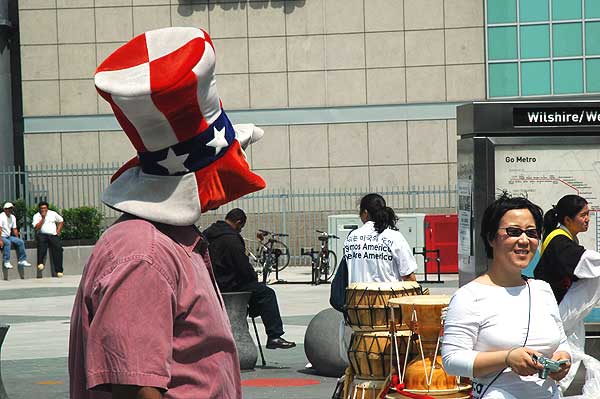

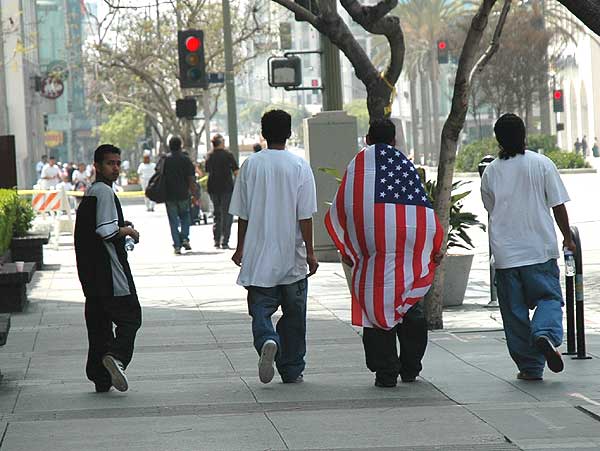
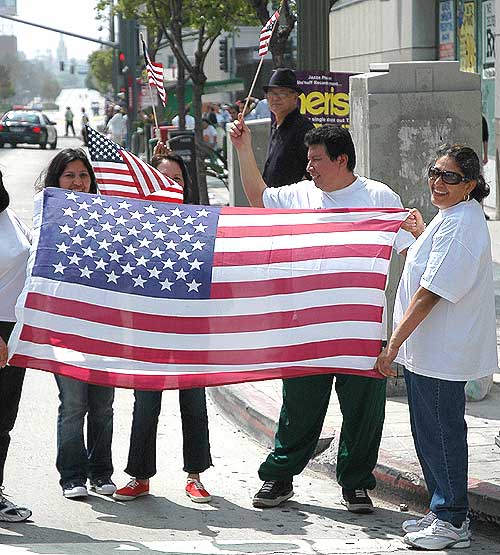
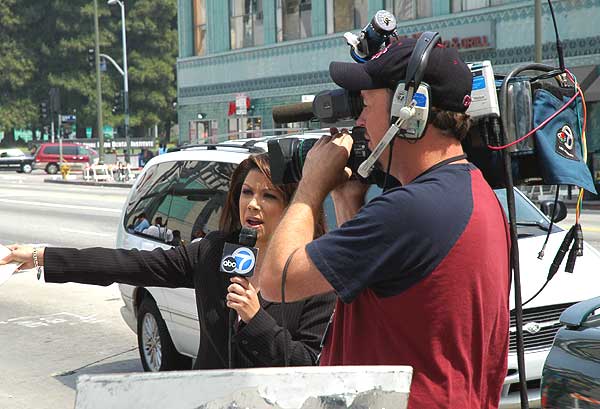
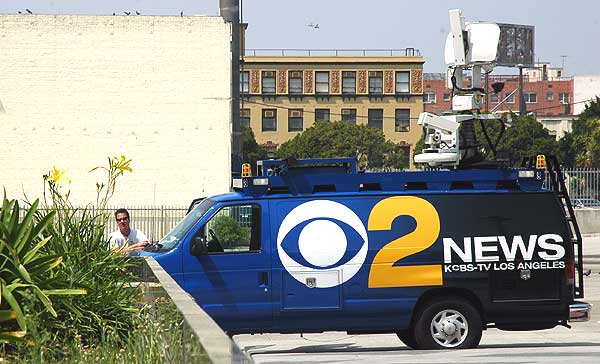
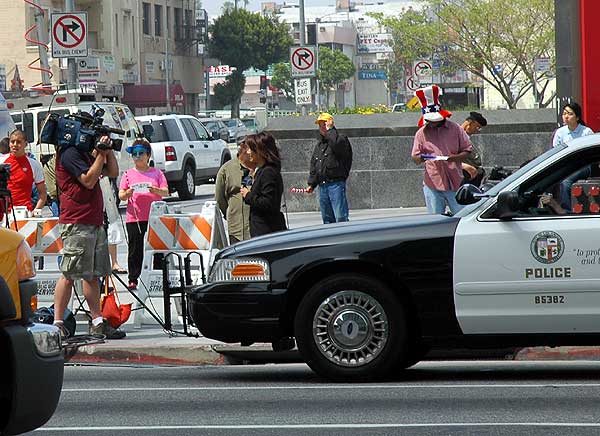
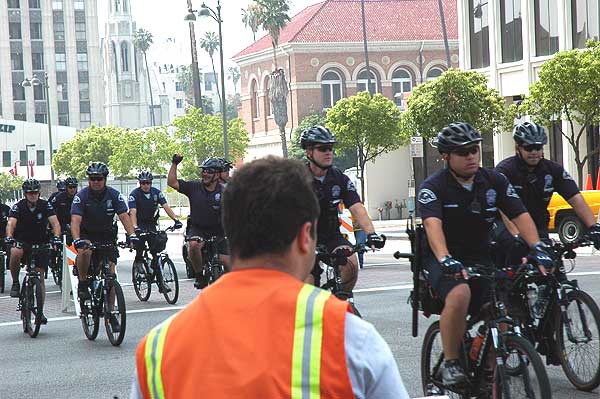
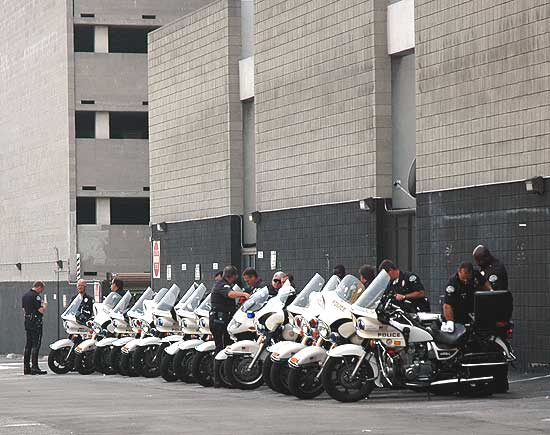

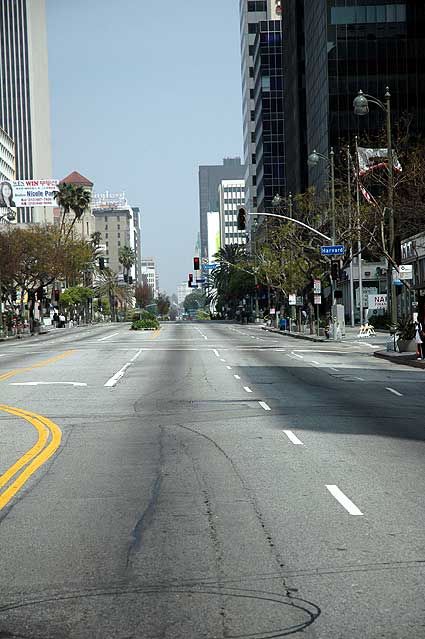
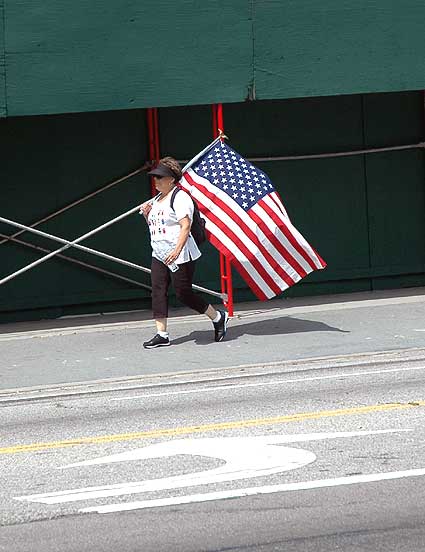
 The new issue of
The new issue of